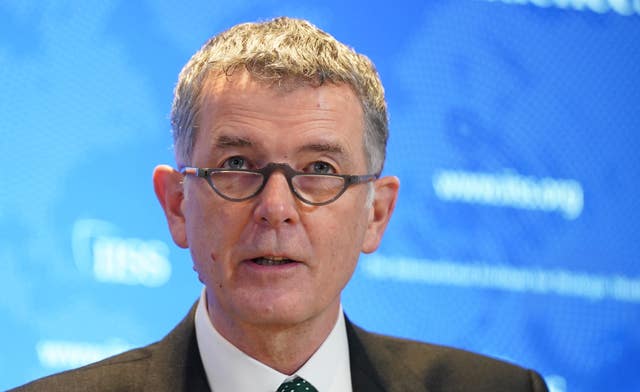Foreign Secretary Liz Truss has warned Russia’s Vladimir Putin against making a “strategic mistake” by launching an invasion of Ukraine.
Ms Truss was speaking as Nato foreign ministers gathered in Latvia to consider how to respond to Russia’s military build-up near the Ukrainian border and the tensions on the frontier between Belarus and Poland.
She will use the summit in Riga to call for the alliance to present a united front in standing up to Moscow while also keeping open channels of communication with the Kremlin.
This week Foreign Secretary @trussliz is in 🇱🇻 and 🇪🇪 meeting @NATO Allies to talk about:
✅ Security and defence✅ Protecting our freedom and democracy✅ Countering hybrid threats like cyber warfare and chemical attacks
— Foreign, Commonwealth & Development Office (@FCDOGovUK) November 30, 2021
The Foreign Secretary also indicated that Russian influence was stirring up tensions in the Balkans.
Ms Truss said: “We want a world where freedom and democracy don’t just survive, they thrive.
“To this end, we will stand with our fellow democracies against Russia’s malign activity.
“We will support Ukraine and stability in the western Balkans, to safeguard their security and build their economic resilience.”
Proud meeting 🇬🇧 NATO troops in Estonia at the frontier of freedom.
Britain stands with our @NATO allies to defend liberty and democracy and counter malign threats. pic.twitter.com/1yq8Zdge2H
— Liz Truss (@trussliz) November 30, 2021
She rejected claims from Moscow that Nato’s actions were provocative.
“We have seen this playbook from the Kremlin before when Russia falsely claimed its illegal annexation of Crimea was a response to Nato aggression.
“Nato is an alliance forged on the principle of defence, not provocation. Any suggestion that Nato is provoking the Russians is clearly false.
“Any action by Russia to undermine the freedom and democracy that our partners enjoy would be a strategic mistake.”

Her comments were later echoed by the national security adviser Sir Stephen Lovegrove who warned Moscow not see the fall of the Western-backed government in Afghanistan as a sign allies would not stand up for a European democracy.
“There is never going to be a good time to make an incursion into Ukraine,” he told the Commons defence committee.
“They should not make the mistake of interpreting a withdrawal from Afghanistan as a lack of willingness on part of Western allies to stand up for sovereign democracies wherever they are in the world, but certainly in mainland Europe.
“Russian actions sometimes seem to be driven by an opportunistic type of motivation and I would counsel them very, very clearly not to fall into that trap now.”
Ahead of the summit in Latvia, the Foreign Secretary met British troops deployed in Estonia as part of Nato’s enhanced forward presence in the alliance’s eastern members.
The comments from the Foreign Secretary came after MI6 chief Richard Moore said there was a “chronic problem” with Russia and Ukraine.
He told BBC Radio 4’s Today programme: “From time to time we get sort of crises around Ukraine as we worry about build-up of troops and what President Putin’s intentions might be, and therefore it bears very careful watching and it bears very careful signalling to the Russians about, you know, the price that they would have to pay if they intervened, as they did in 2014.
“And, at the same time, frankly, being very clear that again there’s not an adversarial sort of agenda here.
“We’re not trying to encircle Russia, we’re not trying to prevent it from pursuing its legitimate interest.”
But Mr Moore said Russia is an “acute threat”.
🇷🇺Foreign Intelligence Service: #US and #UK attempt to trigger panic amid #EU representatives by manipulating #false claims about an “imminent Russian invasion of #Ukraine” and “subsequent occupation” of Ukrainian territory. pic.twitter.com/NmhzI2lx49
— Russian Embassy, UK (@RussianEmbassy) November 30, 2021
Russia accused the UK and US of attempting to “trigger panic” by “manipulating false claims” about an imminent invasion of Ukraine.




Comments: Our rules
We want our comments to be a lively and valuable part of our community - a place where readers can debate and engage with the most important local issues. The ability to comment on our stories is a privilege, not a right, however, and that privilege may be withdrawn if it is abused or misused.
Please report any comments that break our rules.
Read the rules here